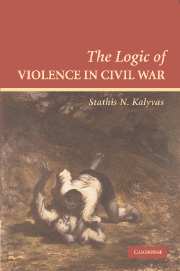Crossref Citations
This Book has been
cited by the following publications. This list is generated based on data provided by Crossref.
Wood, Elisabeth Jean
2006.
The Ethical Challenges of Field Research in Conflict Zones.
Qualitative Sociology,
Vol. 29,
Issue. 3,
p.
373.
Bohara, Alok K.
Mitchell, Neil J.
and
Nepal, Mani
2006.
Opportunity, Democracy, and the Exchange of Political Violence.
Journal of Conflict Resolution,
Vol. 50,
Issue. 1,
p.
108.
Autesserre, Séverine
2006.
Local Violence, National Peace? Postwar “Settlement” in the Eastern D.R. Congo (2003–2006).
African Studies Review,
Vol. 49,
Issue. 3,
p.
1.
Herring, Ronald J.
and
Agarwala, Rina
2006.
INTRODUCTION.
Critical Asian Studies,
Vol. 38,
Issue. 4,
p.
323.
Roxborough, Ian
2006.
Learning and Diffusing the Lessons of Counterinsurgency: The U.S. Military from Vietnam to Iraq.
Sociological Focus,
Vol. 39,
Issue. 4,
p.
319.
HUMPHREYS, MACARTAN
and
WEINSTEIN, JEREMY M.
2006.
Handling and Manhandling Civilians in Civil War.
American Political Science Review,
Vol. 100,
Issue. 3,
p.
429.
Butler, Christopher K.
Gluch, Tali
and
Mitchell, Neil J.
2007.
Security Forces and Sexual Violence: A Cross-National Analysis of a Principal—Agent Argument.
Journal of Peace Research,
Vol. 44,
Issue. 6,
p.
669.
Kalyvas, Stathis N.
and
Kocher, Matthew Adam
2007.
Ethnic Cleavages and Irregular War: Iraq and Vietnam.
Politics & Society,
Vol. 35,
Issue. 2,
p.
183.
Straus, Scott
2007.
Second-Generation Comparative Research on Genocide.
World Politics,
Vol. 59,
Issue. 3,
p.
476.
DE LA CALLE ROBLES, LUIS
2007.
Fighting for Local Control: Street Violence in the Basque Country.
International Studies Quarterly,
Vol. 51,
Issue. 2,
p.
431.
Zhukov, Yuri
2007.
Examining the Authoritarian Model of Counter-insurgency: The Soviet Campaign Against the Ukrainian Insurgent Army.
Small Wars & Insurgencies,
Vol. 18,
Issue. 3,
p.
439.
Kalyvas, Stathis N.
and
Kocher, Matthew Adam
2007.
How “Free” is Free Riding in Civil Wars?: Violence, Insurgency, and the Collective Action Problem.
World Politics,
Vol. 59,
Issue. 2,
p.
177.
Berman, Eli
and
Laitin, David
2007.
Eli Berman and David Laitin.
Perspectives on Politics,
Vol. 5,
Issue. 1,
p.
122.
Wood, Elisabeth Jean
2007.
New Perspectives in Political Ethnography.
p.
205.
Eck, Kristine
and
Hultman, Lisa
2007.
One-Sided Violence Against Civilians in War.
Journal of Peace Research,
Vol. 44,
Issue. 2,
p.
233.
Tanner, Samuel
2007.
Le génocide à l’épreuve des massacres de masse contemporains : vers une rupture paradigmatique ?.
Criminologie,
Vol. 39,
Issue. 2,
p.
39.
Autesserre, Séverine
2007.
D. R. Congo: Explaining Peace Building Failures, 2003-2006.
Review of African Political Economy,
Vol. 34,
Issue. 113,
Levy, Jack S.
2007.
Qualitative Methods and Cross-Method Dialogue in Political Science.
Comparative Political Studies,
Vol. 40,
Issue. 2,
p.
196.
HEGER, LINDSAY
and
SALEHYAN, IDEAN
2007.
Ruthless Rulers: Coalition Size and the Severity of Civil Conflict.
International Studies Quarterly,
Vol. 51,
Issue. 2,
p.
385.
Mahoney, James
2007.
Qualitative Methodology and Comparative Politics.
Comparative Political Studies,
Vol. 40,
Issue. 2,
p.
122.



